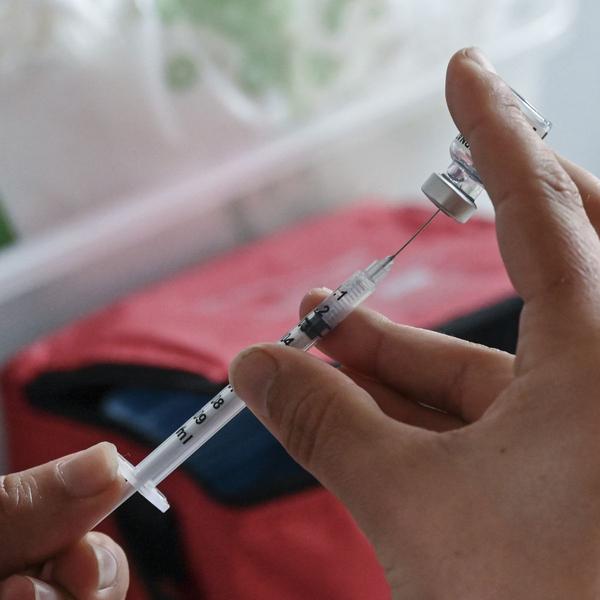COVID vaccines: how to properly protect immunocompromised people?
On January 6, when Margaret Collins, a 43-year-old geologist from Texas, received her first dose of the Moderna vaccine, she returned home and burst into tears.
“I had finally had my dose. I saw it as a return to the life I loved. »
Margaret considers herself to be outgoing. She had to become a hermit during the pandemic. She and her husband rarely went out and never without their masks. Her caution is warranted as she suffers from a generalized autoimmune disease which includes hepatitis, psoriatic arthritis, vitiligo and type 1 diabetes. She is also particularly vulnerable to COVID-19 as she received a transplant pancreas and kidney in 2014. So she takes three treatments to suppress her immune system so that her body does not reject these organs. Vaccines work by harnessing the functions of a competent immune system.
Since the launch of the first vaccine against COVID-19, immunocompromised people have been living in uncertainty. They are waiting to find out whether vaccination offers them protection, and if so, how much. Clinical trials of vaccines have included very few immunocompromised subjects. Including them could have interfered with the results on their effectiveness for the general population. Thus, this group was able to have only very little data on the effects of vaccination taking into account their state of health. Today, studies are coming in dribs and drabs.
“We begin to understand some things that we didn't know, whereas before, we weren't aware of what we didn't know,” says Peter Martin, hematologist and oncologist at Weill Cornell Medicine in New York.
It is difficult to estimate the number of immunocompromised people in France and around the world. In the United States alone, a study determined that approximately 9 million Americans with private insurance use immunosuppressive treatments. However, this number does not include immunocompromised patients who are not on treatment or who do not have private supplementary insurance.
Since the beginning of the pandemic, Margaret has worried about how her body might react to the vaccine. And when she read that a study found that antibody levels in organ recipients were low after the first dose of the messenger RNA vaccine, she panicked.

Even though she was vaccinated and always wore a mask, she wondered if she was really protected. “It really scared me. »
A follow-up study showed that half of organ recipients responded well to the vaccine. But that didn't reassure Margaret. "Basically, it's a bit of a gamble," she says.
A study published on June 14 provides a glimmer of hope. After two doses of a messenger RNA vaccine, thirty transplant recipients with little or no antibodies received a third dose. It was not always the same vaccine as for the first two. For the six people whose antibody levels were low, their levels rose. A quarter of the remaining subjects, whose bodies had never responded to the vaccine, developed antibody levels high enough to protect against COVID-19 after a third dose.
< p lang="en" dir="ltr">Thanks to your team @RadioMirchi, @indu_r for this beautiful gesture of support. Mirchi has always been most ethica… https://t.co/i5Qrs9KZKa— वरुण 🇮🇳 Fri Aug 14 10:04:04 +0000 2020
In France, the Ministry of Solidarity and Health recommends the injection of a third dose for severely immunocompromised people.
The study in question has considerable limitations. It covers only very few subjects and different combinations of vaccines.
A VERY DIVERSIFIED GROUP
Immunocompromised people are generally classified into two categories. The first are those with an underlying medical condition that weakens their immune system, for example, people with leukemia, uncontrolled HIV, or a rare genetic disease. The second includes all those who require immunosuppressive treatments, especially after an organ transplant, because of rheumatic diseases or certain cancers. Some situations fit into both categories, for example chronic lymphocytic leukemia or lupus.
Factors that can affect a patient's response to a vaccine include the drugs they are given and their effects, the duration of treatment, the disease they have and their history of infection. For organ recipients, the time elapsed since the transplant is also taken into account.
"That's why it's so important for people with immunosuppression to talk to an expert about their specific situation because the range of variability is so wide," advises Aaron Richterman, disease specialist diseases at the Perelman School of Medicine at the University of Pennsylvania.
UNCLEAR INDICATORS
Variable responses to COVID-19 vaccines are explained by the wide range of conditions and drugs that weaken the immune system. Currently, the evidence scientists have indicates that the lowest responses have been in organ recipients, in some leukemia patients, and in people on certain specific treatments. Among the drugs that reduce the immune response are mycophenolate, which prevents organ rejection, rituximab, an antibody used in the treatment of blood cancers and certain autoimmune diseases such as rheumatoid arthritis, and finally the methotrexate, designed to treat certain cancers and autoimmune diseases.
For example, one study found that only 54% of 658 organ recipients developed antibodies after the injection of two doses of messenger RNA vaccine. This rate was even lower in patients under treatment with mycophenolate, for example. A similar study of 609 kidney transplant recipients found that only half had detectable antibodies after messenger RNA vaccination compared to just 5% of those taking belatacept. Transplant recipients produced even fewer antibodies after the injection of a single dose of the Johnson & Johnson.
How to Get Free N95 Masks from the US Government
GO
Codeco of December 3, 2021: the new measures target schools, masks, events, but not the horeca
GO
Sunburn: how to make up for the damage? - Miss
GO
Beauty coaching: can I apply oil if I have oily skin?
GO